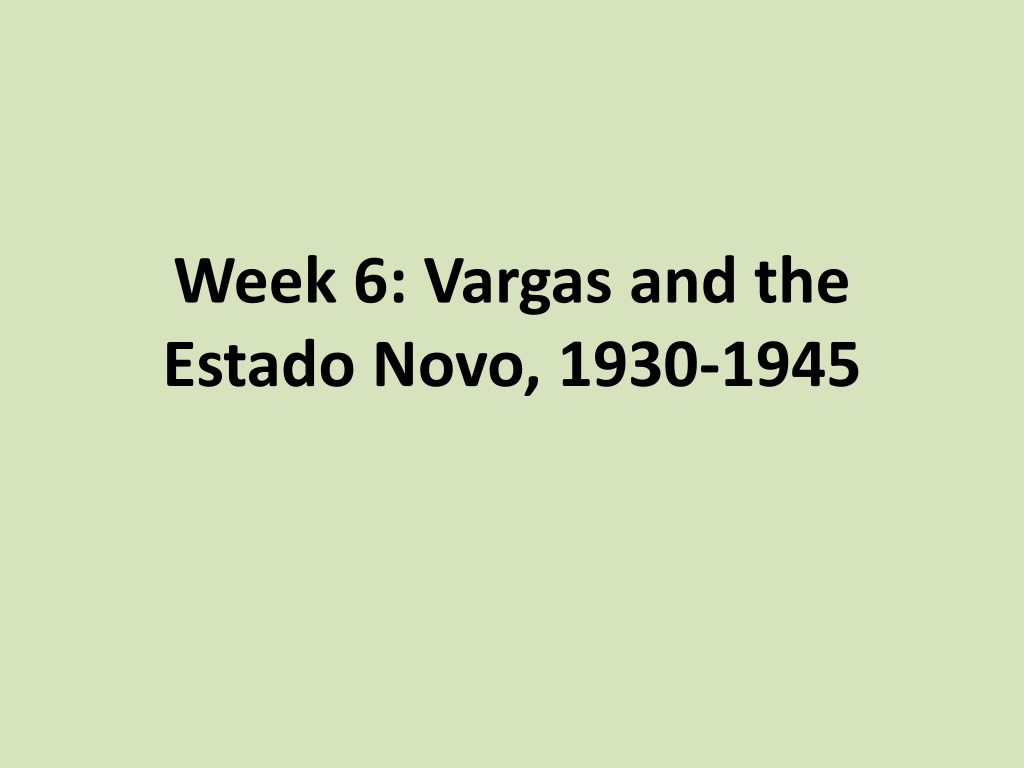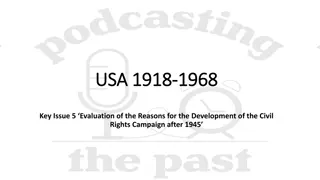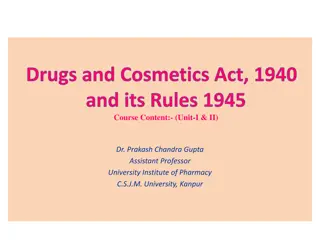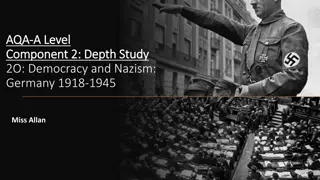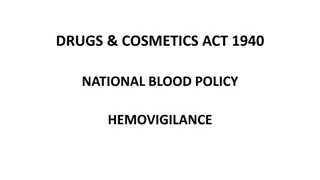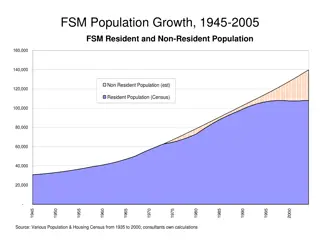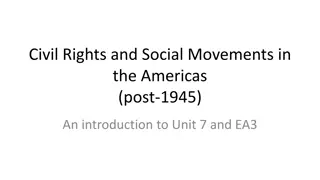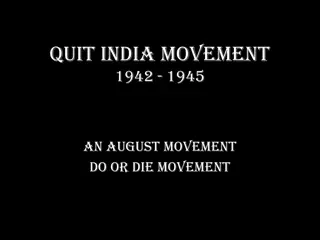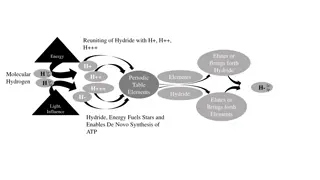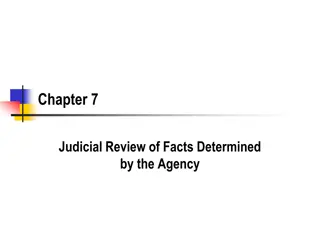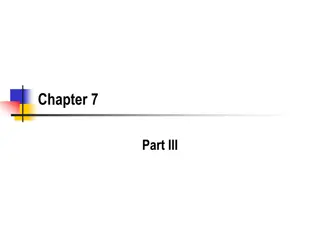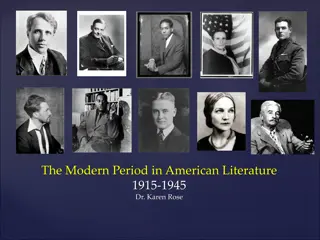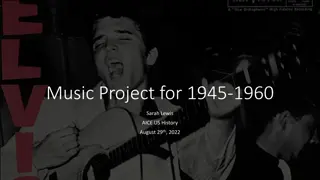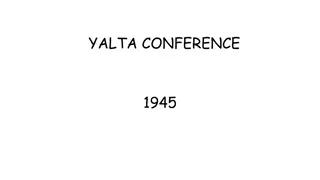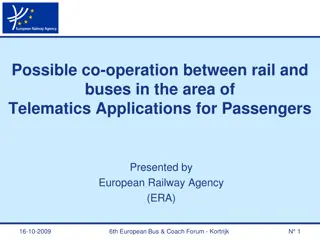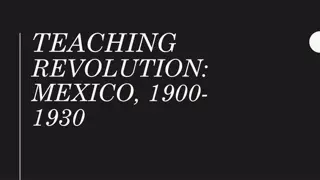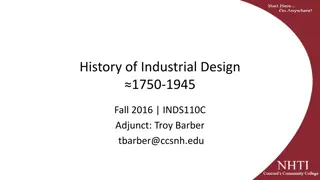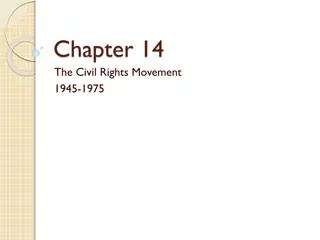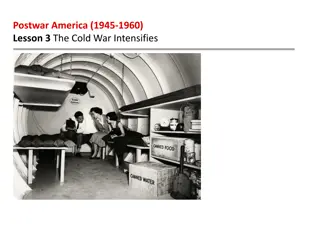The Era of Vargas and the Estado Novo (1930-1945)
Getúlio Vargas's rise to power in 1930, the challenges he faced, his adept political maneuvering, and the consolidation of his authority marked a transformative period in Brazilian history. Vargas's regime navigated through economic crises, political dissent, and regional rivalries, shaping Brazil's sociopolitical landscape amidst global tensions leading up to World War II.
Download Presentation

Please find below an Image/Link to download the presentation.
The content on the website is provided AS IS for your information and personal use only. It may not be sold, licensed, or shared on other websites without obtaining consent from the author.If you encounter any issues during the download, it is possible that the publisher has removed the file from their server.
You are allowed to download the files provided on this website for personal or commercial use, subject to the condition that they are used lawfully. All files are the property of their respective owners.
The content on the website is provided AS IS for your information and personal use only. It may not be sold, licensed, or shared on other websites without obtaining consent from the author.
E N D
Presentation Transcript
Week 6: Vargas and the Estado Novo, 1930-1945
Vargas comes to power, 1930 Elections perceived as corrupt and flawed Dissatisfaction among tenentes; barracks revolts and Prestes Column regional jealousy of Sao Paulo s dominance; growth of Rio Grande do Sul Wall St Crash 1929: coffee prices massively hit 1929 Liberal Alliance formed to elect Vargas instead of another paulista president Assassination of Jo o Pessoa Vargas coup from Rio Grande and Minas Military back Vargas from Rio
Vargas: a product of the Old Republic Vargas managed with extreme competence the complex regional political game, redefining loyalties, isolating resistance and shaping a new system of subordination to the goals of a new power centre. To this end, he could count on his experience as a politician coming from the Old Republic, something he never ceased to be. Aspasia Camargo et. al, O Golpe Silencioso (1989)
How much change does Vargas effect personally? Vargas builds a cult of personality, but: Structural economic and social changes are common to other Latin American countries in the period International political arena: communism v fascism; build-up to World War II; US and Germany vie for influence in Brazil How successful are initiatives of Vargas regimes? Distinction between rhetoric and practice?
Consolidating power, 1930-1934 Heterogeneous aims / interests behind Liberal Alliance and 1930 Revolution Therefore, just staying in power is a challenge initially Economic crisis (Wall Street crash, 1929) Declaration of emergency powers November 1930; states now controlled by central government; rule by interventors Sao Paulo Constitutionalist War, 1932 No backing for SP from other states Military loyal in exchange for favours regionalist threat defeated
http://upload.wikimedia.org/wikipedia/commons/1/15/Cartaz_Revolucion%C3%A1rio_1.jpghttp://upload.wikimedia.org/wikipedia/commons/1/15/Cartaz_Revolucion%C3%A1rio_1.jpg http://upload.wikimedia.org/wikipedia/commons/thumb/a/ad/Volunt%C3%A1rio_paulista_na_Revolu%C3%A7%C3%A3o_Constitucionalista.jpg/180px-Volunt%C3%A1rio_paulista_na_Revolu%C3%A7%C3%A3o_Constitucionalista.jpg
A new Constitution, 1934 Liberal political structures largely remain Balances new centralised power with ongoing significant influence of states new government responsibility for social and economic welfare Women s suffrage; secret ballot; collective representation for unions as well as individual voters
Negotiating between right and left 1930s ideological polarisation... Vargas probably further to the right, but not reducible to either left or right Instead he manipulates both to stay in power Left: Partido Comunista Brasileiro (est. 1922); Alian a National Libertadora Right: A o Integralista Brasileira (AIB) Coup attempt by Left, 1935 emergency powers again Vargas declares Estado Novo, November 1937 Coup attempt by Right, 1938: excuse to repress the Right Vargas establishes
Dictatorship: The Estado Novo, 1937- 1945 Repression of political enemies: imprisonment, torture, exile, censorship... Extradition of Olga Prestes to Nazi concentration camp Centralization of power; use of intendentes in states, and technocrats controlled by expanding central government Military co-opted (for now): army budget grows, states powers curbed Industrialisation: industrial output doubles during 1930s; economic growth about 4% average, 1930-1945 Nationalism through popular culture
Extradition to Germany of Olga Prestes
Corporatism Incorporation of different interest groups and economic sectors (syndicates) within state apparatus So they cannot be sources of conflict Unions co-opted into state as political base for Vargas No inter-union communication; no right to strike Social / welfare legislation for urban workers ( Father of the Poor ?) Murilo de Carvalho: idea of social citizenship without political citizenship Rural areas neglected New style from Old Republic: appeal to ordinary Brazilians Many poor Brazilians idolize Vargas for improvements in their lives
World War II Sympathy with Axis powers: fascism, German/ Italian communities But also sympathy and ties to US/ Britain/ France Military/ trade relationship with Germany, e.g. in 1938 $55M worth of armaments ordered from Krupp Industries Americans court Brazil economically and culturally, e.g. 1940 loan of $20M, later $45M, to build VOLTA REDONDA STEEL MILL Japanese bomb Pearl Harbour, 1941; Brazil comes in on Allied side ...but, sows seeds for Vargas downfall
The Mineiro Manifesto, 1943 If we fight against Fascism alongside the United Nations so that liberty and democracy may be restored to all peoples, surely we are not asking too much in demanding the same rights and guarantees for ourselves?
Readings -Skidmore, Brazil, ch 5; Frank D McCann, Soldiers of the P tria : a history of the Brazilian Army, 1889-1937 (2004), Chapter 7, The Revolution of 1930 , pp 259-300 -Robert Levine, Father of the Poor? ch 3; Oliveira Vianna, Why the Estado Novo? in Brazil Reader - Ordinary People in Brazil Reader; -Joel Wolfe, Guest Editor s Introduction: Get lio Vargas and his Enduring Legacy for Brazil, Luso-Brazilian Review 1994
Discussion questions What was the rationale for the Estado Novo? What political problems of the day did it purport to solve (beyond keeping Vargas in power)? To what degree were the aims of the Estado Novo implemented? Did Vargas deserve the title Father of the Poor ? What was the relationship between Vargas and the military? What were Vargas legacies to Brazilian politics?
